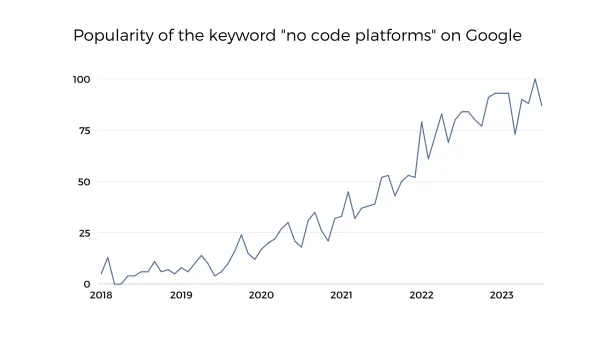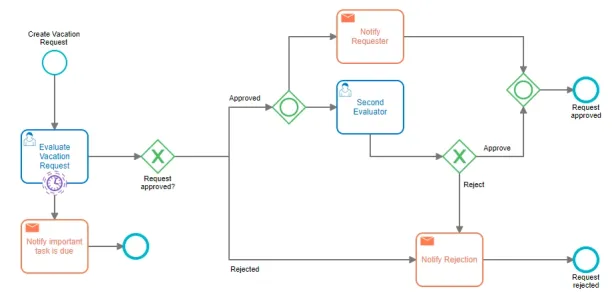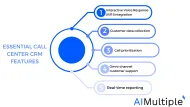8 Use Cases of No Code CRM in 2024

Source: Google Trends
Figure 1. Interest in no code platforms worldwide.
Though Salesforce started out with the promise of “The End of Software”, it now takes months even for a small organization with tens of employees to adopt a CRM solution like Salesforce. 1. The desire to speed up implementation of automation and other functionality has been driving the growth of “no-code”‘s popularity in recent years (See Figure 1).
No-code platforms have swiftly grown to be essential tools for businesses who want to remain competitive in an increasingly digital market. They offer a way for firms to create digital solutions without any need for expertise in programming.
This article will examine the potential effects of no-code on customer relationship management (CRM) and how businesses might use it to their advantage.
What is no-code?
The term “no-code” refers to the development of software applications without the assistance of typical coding or programming languages. According to Gartner, by 2025, 70% of new apps created by enterprises will use low-code or no-code technologies, up from less than 25% in 2020.
By dragging and dropping pre-built components, users may construct and customize apps using these platforms’ easy to use, visual interfaces. As no coding required, these platforms give businesses the ability to swiftly build, test, and deploy solutions to match their specific needs without extensive coding skills.
Sponsored
Discover Creatio – the no-code platform for workflow automation and CRM, offering businesses freedom and flexibility. Trusted by thousands of enterprises in more than 100 countries, millions of workflows are launched on the platform every single day. Watch their short video clip to get a grasp of their services:
Core features of no-code platforms
Drag-and-drop interface: No-code platforms often provide a user-friendly, visual interface that enables users to create applications by dragging and dropping items like forms, buttons, and text fields onto a canvas.
Pre-built templates and components: No-code platforms provide pre-built templates and components that can be easily altered to meet particular demands in order to speed up the development process.
Visual workflow builder: No-code solutions let users construct and manage complicated processes without writing any code by utilizing a visual builder to design and automate workflows.

Source: Flokzu
Figure 1. Example of a no code visual workflow.
Data management and integration: Built-in capabilities for managing and integrating data from diverse sources, such as databases, APIs, and third-party applications, are often offered by no-code platforms.
Collaboration and access control: No-code solutions often come with tools for controlling user privileges, roles, and collaboration to make sure that only the appropriate users have access to the right resources on the platform.
Responsive design: Users usually are able to develop applications using no-code platforms, guaranteeing that the applications function correctly across a variety of devices and screen sizes.
Security and compliance: No-code platforms place a high priority on security and compliance by offering built-in solutions to safeguard data, control user access, and make sure that rules particular to the industry are followed.
App hosting and deployment: No-code platforms often come with choices for hosting and deploying apps, making it simple for users to launch and manage their own solutions.
Analytics and reporting: Many no-code solutions come with integrated analytics and reporting capabilities that let users keep tabs on critical metrics like application performance and user engagement.
Benefits of no-code in CRM
1- Unlimited customization
Without the limits of pre-built solutions, no-code platforms enable businesses to design custom CRM apps that suit their specific demands and workflows. As no-code platforms are fully customizable, they can help companies optimize operations, increase efficiency, and improve customer experiences by allowing users to tailor their own custom CRM system.
2- Enhanced User Interface (UI)
These platforms provide user-friendly interfaces that are intuitive and simple to use for non-technical individuals. This enables businesses to design apps with visually appealing and user-centric user interfaces, thereby enhancing user adoption and ensuring employees have quick and easy access to the information they need.
3- Automating repetitive tasks
Building a CRM with no-code capabilities can assist companies in automating repetitive tasks, freeing up time and resources for employees to focus on more strategic efforts. No-code platforms can significantly boost organizational productivity and efficiency by streamlining workflows and decreasing labor intensive tasks.
4- Reduced downtime
By empowering non-technical users to make changes and develop applications without the need for complex coding, no-code platforms significantly reduce the time spent on development and deployment. Additionally, no-code solutions offer seamless integrations and allow for real-time updates, ensuring that CRM systems are always up-to-date and functional. As a result, businesses can maintain continuous and efficient CRM operations, minimizing any potential downtime that might impact customer relationships and overall productivity.
5- Better team alignment
No-code platforms can facilitate collaboration between different departments within an organization, such as marketing, sales, and customer support. By creating custom applications that integrate with their own CRM systems, employees from various departments can work together on shared projects, access real-time customer data, and communicate more effectively.
6- Error reduction and easy troubleshooting
No-code CRM platforms reduce the likelihood of errors stemming from manual coding and complex development processes. With a visual, drag-and-drop interface, business users can create and modify applications with greater accuracy and ease. Additionally, no-code platforms often include built-in error detection and troubleshooting features that help identify and resolve issues more quickly, further minimizing the potential for production downtime.
Top 8 no-code CRM use cases
Code-based CRM systems often involve complex coding and dependence on IT support for modifications. With no-code platforms, sales teams can easily build custom applications for sales process automation that enhance CRM marketing and processes including:
1- Automating lead qualification
No-code CRM can help businesses automate the process of qualifying leads. Instead of manually going through each lead to determine its potential value, you can use a no-code CRM system to set certain parameters. When these parameters are met, the system automatically tags these leads as qualified. This can save a significant amount of time and resources.
2- Contract management
Businesses often have to deal with numerous contracts, whether it’s with clients, suppliers, or partners. Managing these contracts can be difficult and time-consuming. However, a no-code CRM can streamline this process. Users can create custom workflows for contract approval, renewal, and tracking, ensuring that no detail is overlooked and improving compliance.
3- Sales collateral management
No-code CRMs can also be used to manage sales collateral effectively. Users can design a system that organizes and stores all sales-related documents, presentations, case studies, etc. The system can be made easily searchable and allow quick updates, ensuring that the sales team always has the most relevant and up-to-date information at their fingertips.
4- Streamlining sales forecasting
Sales forecasting is crucial for business planning. It allows companies to predict their future sales and make informed decisions about hiring, budgeting, etc. With a no-code CRM, businesses can automate the process of collecting and analyzing the necessary data to produce accurate sales forecasts. This not only saves time but also reduces the likelihood of human error.
5- Personalized marketing campaigns
Traditional CRM systems often require IT support to make changes, leading to longer implementation times and limited customization options. No-code platforms enable marketing teams to create custom applications for CRM systems without requiring coding expertise, resulting in faster deployment and greater flexibility in designing and executing personalized, multichannel marketing campaigns.
6- Event management
Event management can be simplified using no-code platforms by creating custom applications that integrate with CRM systems, streamlining event planning, registration, and attendee tracking.
7- Custom reporting and data visualization
Traditional CRM systems often require coding skills for creating custom reports, which can be time-consuming and limit the accessibility of valuable insights for business users. No-code platforms empower non-technical users to create custom reports and data visualizations based on CRM data, fostering a data-driven culture within the organization.
8- Location-based services
No-code platforms empower businesses to create custom applications that incorporate location-based services, such as mapping customer locations, optimizing sales routes, or visualizing regional sales performance. In comparison, traditional CRM systems may require coding expertise or third-party tools to integrate location-based functionalities.
Further Reading
- Top 12 CRM Software: A Comprehensive Vendor Selection Guide
- Top 7 Low-Code Software
- Top 10 Financial CRM Software Benchmarking
For those interested, here is our data-driven list of CRM software.
Reach us if you need help:
External Links
- 1. The History of Salesforce, Salesforce. How long does a Salesforce implementation take?,Quora. Accessed on May/18/2023

Cem has been the principal analyst at AIMultiple since 2017. AIMultiple informs hundreds of thousands of businesses (as per similarWeb) including 60% of Fortune 500 every month.
Cem's work has been cited by leading global publications including Business Insider, Forbes, Washington Post, global firms like Deloitte, HPE, NGOs like World Economic Forum and supranational organizations like European Commission. You can see more reputable companies and media that referenced AIMultiple.
Throughout his career, Cem served as a tech consultant, tech buyer and tech entrepreneur. He advised businesses on their enterprise software, automation, cloud, AI / ML and other technology related decisions at McKinsey & Company and Altman Solon for more than a decade. He also published a McKinsey report on digitalization.
He led technology strategy and procurement of a telco while reporting to the CEO. He has also led commercial growth of deep tech company Hypatos that reached a 7 digit annual recurring revenue and a 9 digit valuation from 0 within 2 years. Cem's work in Hypatos was covered by leading technology publications like TechCrunch and Business Insider.
Cem regularly speaks at international technology conferences. He graduated from Bogazici University as a computer engineer and holds an MBA from Columbia Business School.
To stay up-to-date on B2B tech & accelerate your enterprise:
Follow on

Comments
Your email address will not be published. All fields are required.